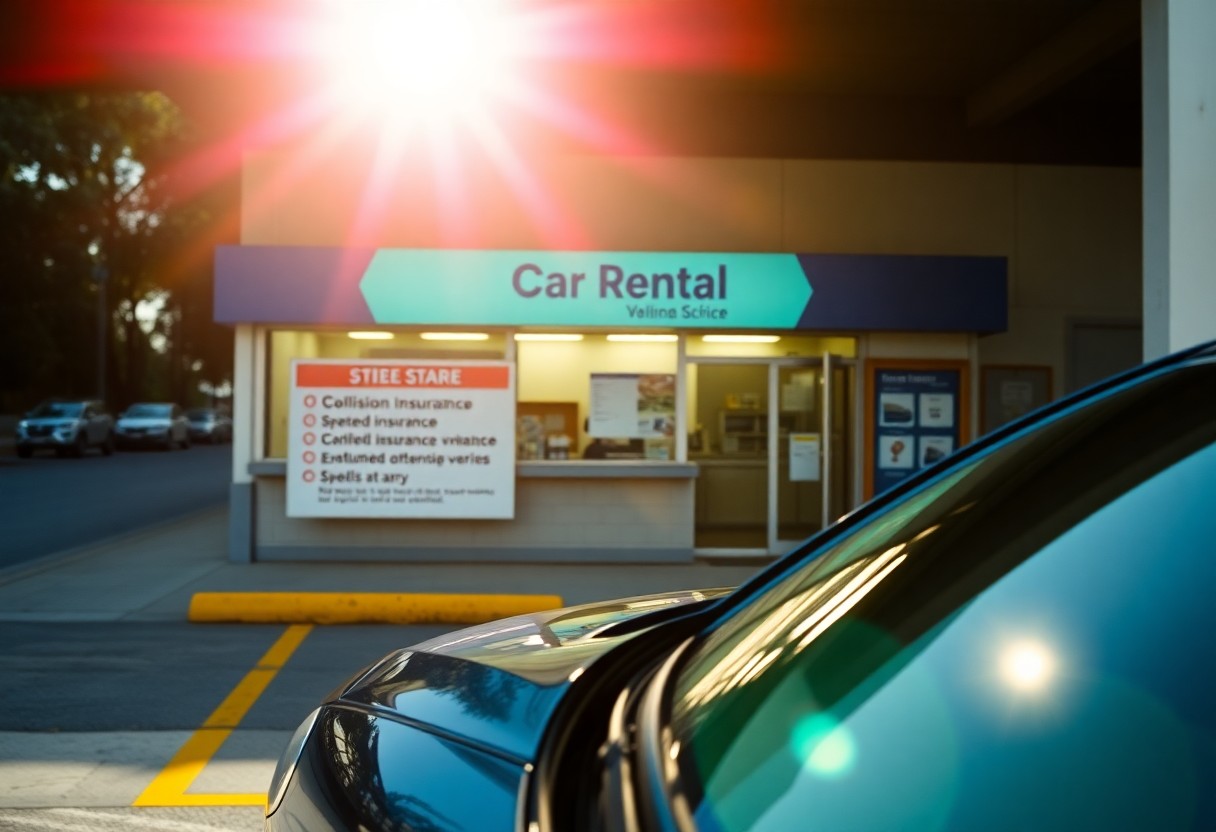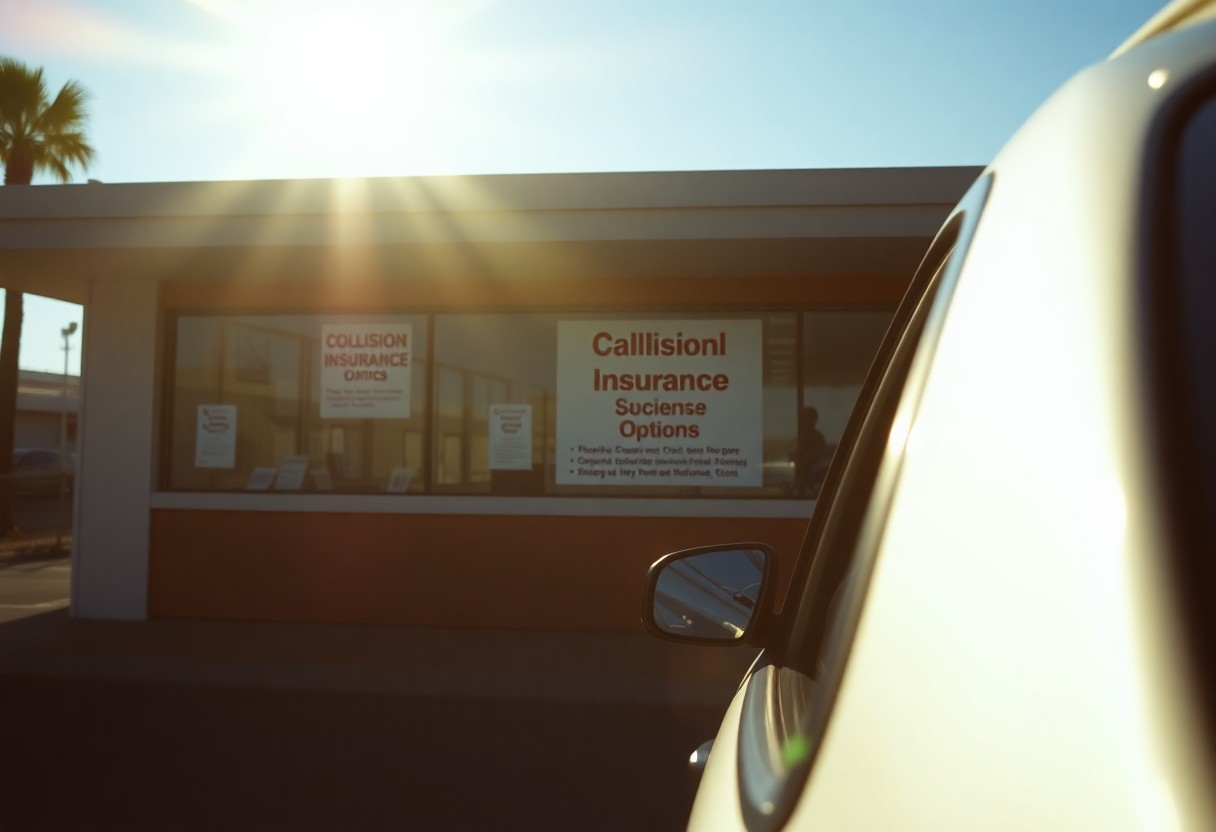Making decisions about collision insurance at the rental car counter can often leave you feeling confused and unsure about the best option for your needs. Before embarking on your next car rental journey, it's essential to assess whether your current insurance coverage adequately protects you from any potential risks. Your personal auto insurance policy and the benefits offered by your credit card might provide substantial protection against rental car damage without the need for additional purchases. However, if you do not own a vehicle or your coverage is limited, you may be putting yourself at significant financial risk without proper protection. By carefully reviewing your existing insurance policy and credit card perks, you can make an informed decision that not only saves you money but also guarantees that you are completely protected during your rental period.

Thoroughly Assess Your Current Insurance Coverage for Rental Cars
To make a knowledgeable decision about rental car insurance, conducting a detailed review of your existing coverage options is crucial. A comprehensive evaluation of your current insurance can save you anywhere from $140 to $280 on a weekly rental by avoiding unnecessary duplicate insurance policies. Understanding precisely what your insurance covers before you rent can not only provide peace of mind but also significantly reduce unexpected expenses, allowing you to better allocate your budget towards an enjoyable travel experience. Take the time to read through your policy documents, and don’t hesitate to reach out to your insurance agent for clarification on any specific points.
Examine Your Personal Auto Insurance Policy in Detail
Alongside reviewing your personal auto policy, it's vital to determine whether your current insurance includes comprehensive and collision coverage for rental vehicles. Typically, the deductible associated with your personal insurance will extend to rentals as well. Therefore, it's wise to reach out to your insurance provider to confirm if your policy also covers Loss of Use and Diminution of Value claims related to rental cars. This proactive measure can save you from unexpected costs and ensure that you have adequate protection while driving a rental vehicle, allowing you to enjoy your trip without worrying about potential financial pitfalls.
Maximize Your Understanding of Credit Card Benefits for Rental Coverage
Many credit cards offer primary or secondary collision coverage for rental cars, making it crucial to understand the specific benefits associated with your card. Most premium credit cards will provide rental car protection if you use that card for the entire rental cost. Coverage durations typically range from 15 to 31 days, depending on the card issuer. Familiarizing yourself with these details can empower you to make a more informed decision and potentially save money on rental insurance, ensuring you get the best value from your credit card perks.
Diving deeper into the specifics of credit card protection reveals that there are certain limitations you should be aware of. Your coverage might exclude specific types of vehicles, such as luxury cars or oversized SUVs. Additionally, you must decline the rental company’s collision damage waiver to activate your credit card coverage. Some credit cards also have requirements that necessitate you to notify them before the rental period begins to guarantee that your coverage is in effect. Being aware of these conditions can help you avoid any surprises during your rental period.

Understanding the Financial Implications of Rental Car Insurance Choices
Your decisions regarding rental car insurance can have a substantial impact on your financial situation. While the daily rate for a collision damage waiver (CDW) typically ranges from $20 to $30 per day, it’s important to recognize that your existing auto insurance or credit card benefits may already provide complementary coverage without any added costs. Gaining a clear understanding of these various costs and benefits allows you to make a financially sound choice that aligns perfectly with your personal needs, potentially saving you a significant amount of money while ensuring you are adequately protected in case of an incident.
Perform a Comparative Analysis of Rental Insurance Costs
| Rental Counter CDW | $20-30/day |
| Credit Card Coverage | $0 (included) |
| Personal Auto Insurance | $0 (included) |
By analyzing the costs associated with various rental insurance options, it becomes clear that you could save up to $210 over a week-long rental by choosing to utilize your existing coverage rather than purchasing additional insurance at the rental counter. This insight can help inform your economic choices while traveling, enhancing your overall experience and allowing you to allocate funds more effectively.
Stay Informed About Hidden Fees and Additional Charges
In addition to your base rental rate, companies frequently impose unexpected charges, such as loss-of-use fees, administrative fees, and diminished value charges. These additional expenses can inflate your overall costs by up to 30-50% if you lack the appropriate coverage. Therefore, it’s critical to thoroughly review your existing insurance policy and the benefits provided by your credit card. Pay special attention to coverage for loss-of-use fees, as many basic policies may not include these essential protections. Having a credit card that offers primary coverage can protect you from the burden of paying deductibles or risking increased insurance premiums.
Identifying Potential Risk Factors When Renting a Vehicle
Even the most cautious drivers encounter potential risks when renting vehicles, and understanding these risks is vital for making informed insurance decisions. Your exposure could encompass various scenarios such as:
- accidents occurring in unfamiliar locations
- theft or vandalism of the rental car
- damage due to weather-related incidents
- incidents occurring in parking lots
Recognizing these risks empowers you to evaluate your need for additional insurance coverage when renting a vehicle, ensuring that you are prepared for any unforeseen circumstances that may arise during your rental period.
Special Considerations for Renting Cars During International Travel
When it comes to renting cars internationally, extra precautions are necessary. Your standard insurance and credit card benefits may not extend when driving abroad. Statistics reveal that 85% of U.S. auto policies do not cover international rentals, making it crucial to consider additional insurance for overseas travel. This proactive approach can help mitigate potential financial risks and ensure peace of mind as you explore new destinations, allowing you to enjoy your travels without undue worry.
Understanding the Implications of Vehicle Type on Insurance Coverage
Before finalizing your choice of rental vehicle, it’s essential to recognize that luxury cars and specialized vehicles often require additional insurance coverage. Many standard policies impose limits on protection for conventional vehicles, leaving premium models and larger vehicles open to coverage gaps. Furthermore, data indicates that SUVs and luxury vehicles incur a 40% higher repair cost compared to standard cars, which can present significant financial risks if you lack adequate coverage. Basic insurance policies may cap coverage at a value of $50,000, which means you could face considerable out-of-pocket expenses if you damage a high-value rental without the appropriate protection in place.
Adjusting Insurance Needs Based on Unique Circumstances
It’s essential to remember that your insurance needs can fluctuate based on specific circumstances and locations. Your standard coverage may not apply when renting in certain countries, during natural disasters, or for specialized vehicles such as luxury cars or large vans. International rentals typically require additional coverage, as standard insurance policies often do not extend beyond domestic borders, making it vital to ensure you have the right protection in place.
Comprehending Coverage Differences Between Business and Personal Rentals
To ensure that you are sufficiently protected, it’s essential to understand that business and personal rentals have different insurance requirements. Your personal auto insurance might not extend to business-related rentals, and your employer’s insurance might not cover personal use. Industry data indicates that 85% of business travelers require separate coverage when their travel mixes business and personal purposes, underscoring the importance of clarity in understanding your insurance needs and ensuring you are adequately protected in both scenarios.
Evaluating the Impact of Payment Methods on Rental Coverage
When it comes to rental car insurance, business credit cards often provide different coverage levels compared to personal cards. It’s vital to confirm whether your card offers primary or secondary coverage, as this distinction can significantly affect your claims process and potential out-of-pocket expenses. Primary coverage can prevent you from needing to file claims with your personal insurance, which can save you time and hassle in the event of an incident, allowing for a smoother recovery process should an unforeseen situation arise.
Additionally, the payment method can influence deductibles and coverage limits. Premium credit cards frequently offer collision coverage limits up to $75,000, whereas basic cards may restrict coverage to $30,000. Be advised that using debit cards generally provides no coverage and may require additional security deposits, which can complicate the rental process and lead to unexpected challenges during your travel.

Key Factors Relating to Time and Duration of Rental
Your decisions regarding rental car insurance often depend on your rental duration and travel frequency. Both personal auto insurance and credit card coverage typically have specific time limitations regarding rental protection. It’s vital to evaluate your coverage needs differently for short weekend trips compared to longer month-long rentals to ensure you have the right level of protection, especially considering that risks can increase with longer rental periods.
Specific Considerations for Short-term Rentals
Approximately 80% of rental car bookings are for less than five days, making it crucial to understand your options for these brief rentals. Generally, your credit card’s collision coverage will offer sufficient protection for these shorter rental durations. Most credit cards provide 15-day coverage when rentals occur within your home country, and 31 days for international rentals, ensuring you have the necessary protection for shorter trips without incurring additional costs.
Addressing Insurance Gaps for Extended Rental Periods
For longer rental periods, insurance gaps become more pronounced. Standard credit card protection often expires after 15 to 31 days, leaving you vulnerable during extended rentals. Similarly, standard auto policies frequently limit rental coverage to 30 consecutive days, making it crucial to consider additional insurance if your rental exceeds this timeframe, ensuring that you are not left unprotected when you need coverage the most.
Moreover, extended rentals come with an increased risk of damage, as the longer you hold the vehicle, the more exposure it faces to potential incidents. If your rental extends beyond the primary coverage period, securing supplemental insurance is a wise choice. Reports indicate that accident rates escalate by 32% for rentals lasting more than three weeks, highlighting the pressing need for adequate protection during longer trips.
Smart Strategies for Making an Informed Insurance Decision
Ultimately, all insurance decisions should be customized to your unique situation. Your goal is to find the right balance between adequate protection and cost-effective coverage. Research shows that 65% of renters end up overpaying for insurance they don’t need, while a concerning 20% remain dangerously underinsured. Striking this balance is essential for effective financial planning while traveling, ensuring that you are not left vulnerable or overburdened by unnecessary costs.
Utilize This Decision-Making Checklist for Clarity
Making the right choice becomes straightforward when you follow these steps: First, consult your current car insurance policy for coverage specifics. Next, verify your credit card benefits to understand what is included. Lastly, calculate potential costs associated with your rental. If you possess comprehensive coverage on your personal vehicle and a credit card that offers primary rental coverage, you can confidently decline any additional insurance offered at the rental counter, streamlining your rental experience and ensuring you only pay for what you truly need.
Stay Alert for Potential Red Flags
Before you sign any rental agreement, it's imperative to be on the lookout for hidden fees, coverage gaps, and policy exclusions. Rental companies often utilize pressure tactics at the counter, suggesting that their insurance is mandatory when it may not be. Remaining vigilant can help you avoid incurring unnecessary costs and ensure you get the most out of your rental experience.
At the rental counter, stay alert to common issues that could arise, such as unauthorized charges, ambiguous policy terms, and inflated daily rates. Data reveals that rental companies may charge up to $30 per day for collision coverage that you might already have through your credit card or personal auto policy, making it essential to remain informed and cautious to avoid paying for redundant coverage.
Highlighting Essential Takeaways on Rental Car Insurance
Your decision regarding rental car collision insurance hinges on several factors, including your existing coverage and unique circumstances. If you have personal auto insurance with comprehensive coverage or a credit card that provides primary rental coverage, you can confidently opt out of the extra insurance offered at the counter. Conversely, if you do not own a car, lack sufficient coverage, or plan to rent luxury vehicles, securing supplemental insurance is advisable. Before declining coverage at the rental counter, ensure you thoroughly review your current policies and understand their limits. This simple yet vital step can lead to significant savings and protect you from unnecessary expenses during your rental experience.
Frequently Asked Questions About Rental Car Insurance Explained
Q: Does my personal car insurance cover rental vehicles?
A: Most personal car insurance policies extend coverage to rental cars as long as you have collision and comprehensive coverage. It’s essential to contact your insurance provider to confirm the specifics of your coverage, including limits and any restrictions on particular vehicle types. Additionally, be aware that filing a claim for rental car damage may lead to increased insurance rates, so it’s wise to weigh your options carefully.
Q: How does credit card rental car coverage function in practice?
A: Credit cards can provide primary rental car collision coverage when the card is used to cover the full rental cost. This coverage activates when you decline the rental company’s collision damage waiver. Generally, this protection encompasses damage and theft coverage, but the terms can vary significantly by card. Some cards may limit coverage to 15-30 days and exclude luxury vehicles or rentals in certain countries, so it’s vital to read the fine print.
Q: Under what circumstances should I consider purchasing extra collision insurance from the rental company?
A: You should contemplate buying extra collision insurance if you fit into any of the following categories: you don’t own a car, you lack personal auto insurance, you are renting with a debit card, you’re using points for payment, you’re renting luxury vehicles, or your rental duration exceeds your credit card’s coverage period. In addition, for international rentals and those who wish to avoid using personal insurance, getting additional coverage is also advisable. The average cost for this coverage is around $20 per day in most states, which can provide peace of mind during your travels.
The Article: Do You Really Need Extra Collision Insurance for Your Car Rental? appeared first on https://rentacar24.org/
The Article Extra Collision Insurance for Your Car Rental: Is It Necessary? Was Found On https://limitsofstrategy.com



You raise an important point about the often-overlooked details of rental car insurance. I recently faced a similar decision when renting a car for a road trip. After reviewing my personal auto insurance, I found that it covered rentals, but only for certain conditions. This prompted me to dive deeper into my credit card benefits, which offered extended coverage that I hadn’t initially considered.
It’s interesting how many people don’t realize the specifics of their insurance coverage until they actually need it. Your experience resonates with me; I remember renting a car for a trip and finding similar discrepancies in what my personal auto insurance covered. It was surprising to learn about the limitations and conditions that could potentially impact me on the road.
Navigating the ins and outs of rental car insurance can indeed be daunting, especially with so much at stake in terms of financial liability. I completely resonate with your advice about assessing existing coverage. When I rented a car on a recent trip, I was surprised to find that my credit card offered more extensive protection than I initially realized, which saved me from opting for additional insurance. It’s fascinating how many people overlook the benefits tied to their credit cards, often thinking they need to purchase the extra coverage out of caution.